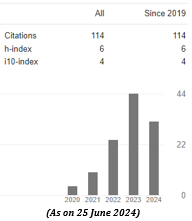Assessment of Ecosystem Services and Disservices in Urban Environment Using Multispectral Image Analysis and Geospatial Mapping
Abstract
Ecosystem service and disservice components have a great impact on the environment as well as on urban life. The aim of the research is to assess the impact of ecosystem services and disservices by tracking the change over a span of 15 years (2005-2020) using satellite image analysis. It was conducted in wards 23 and 29 of Khulna City Corporation (KCC), an area adjacent to the river. The overall work breakdown has been rounded up in a methodological framework which cleaved into two parts focusing on ecosystem services, disservices and multispectral image analysis steps. Multispectral image analysis has been done using Normalized Difference Vegetation Index (NDVI) and Normalized Difference Build-up Index (NDBI). On the other hand, geospatial analysis has been done using Digital Elevation Model (DEM), Service Area Analysis (SAV) and other mapping tool including Geographic Information System (GIS) to show the changed impact of both ecosystem components. The study areas attain provisioning, habitat, cultural and regulatory service components and the disservice elements have been sorted out according to sources. Comparative study showed increase in the buildup area; vegetation coverage because of increasing vegetation, cultivation and gardening practices; good weather and water circulation condition and water body conservation which has significant positive impact on the area. The disservice component like poor drainage condition and solid waste management system and risky infrastructures have negative impact, need to address for the betterment of residence and environment.
Downloads
References
lam, S., & Mohammad, S. N. (2018). Applying the ecosystem approach to the Sundarbans of Bangladesh: Possibilities and challenges. Review of European, Comparative and International Environmental Law, 27(2), 115–129. https://doi.org/10.1111/reel.12230
Aldana-Domínguez, J., Montes, C., Martínez, M., Medina, N., Hahn, J., & Duque, M. (2017). Biodiversity and Ecosystem Services Knowledge in the Colombian Caribbean: Progress and Challenges. Tropical Conservation Science, 10, 1–41. https://doi.org/10.1177/1940082917714229
Andersson, E., Barthel, S., & Ahrné, K. (2007). Measuring social-ecological dynamics behind the generation of ecosystem services. Ecological Applications, 17(5), 1267–1278. https://doi.org/10.1890/06-1116.1
Bolund, P., & Hunhammar, S. (1999). Ecosystem services in urban area. Ecological Economics, 29(2), 293–301. https://doi.org/10.1017/S174217051300046X
Chabay, I. (2018). Land degradation and restoration. In Companion to Environmental Studies. https://doi.org/10.4324/9781315640051-105
de Groot, R. S., Alkemade, R., Braat, L., Hein, L., & Willemen, L. (2010). Challenges in integrating the concept of ecosystem services and values in landscape planning, management and decision making. Ecological Complexity, 7(3), 260–272. https://doi.org/10.1016/j.ecocom.2009.10.006
European Environment Agency. (2011). Green infrastructure and territorial cohesion. In Tecnical Report (Number 18) (Issue 18).
Gómez-Baggethun, E., & Barton, D. N. (2013). Classifying and valuing ecosystem services for urban planning. Ecological Economics, 86(February), 235–245. https://doi.org/10.1016/j.ecolecon.2012.08.019
Hanna, D. E. L., Tomscha, S. A., Ouellet Dallaire, C., & Bennett, E. M. (2018). A review of riverine ecosystem service quantification: Research gaps and recommendations. Journal of Applied Ecology, 55(3), 1299–1311. https://doi.org/10.1111/1365-2664.13045
Haque, M. N., Morshed, S. R., Fattah, M. A., Ishra, A. K., & Saroar, M. (2020). Environmental Risk Zone Identification of an Urban Unit Using GIS and Remote Sensing. BAUET JOURNAL, 2(2), 25–39.
Isbell, F., Gonzalez, A., Loreau, M., Cowles, J., Díaz, S., Hector, A., MacE, G. M., Wardle, D. A., O’Connor, M. I., Duffy, J. E., Turnbull, L. A., Thompson, P. L., & Larigauderie, A. (2017). Linking the influence and dependence of people on biodiversity across scales. Nature, 546(June), 65–72. https://doi.org/10.1038/nature22899
Islam, M. M., Sunny, A. R., Hossain, M. M., & Friess, D. A. (2018). Drivers of mangrove ecosystem service change in the Sundarbans of Bangladesh. Singapore Journal of Tropical Geography, 39(2), 244–265. https://doi.org/10.1111/sjtg.12241
Le Saout, S., Hoffmann, M., Shi, Y., Hughes, A., Bernard, C., Brooks, T. M., Bertzky, B., Butchart, S. H. M., Stuart, S. N., Badman, T., & Rodrigues, A. S. L. (2013). Protected areas and effective biodiversity conservation. Science, 342(6160), 803–805. https://doi.org/10.1126/science.1239268
Lyytimäki, J., Petersen, L. K., Normander, B., & Bezák, P. (2008). Nature as a nuisance? Ecosystem services and disservices to urban lifestyle. Environmental Sciences, 5(3), 161–172. https://doi.org/10.1080/15693430802055524
Maskell, L. C., Crowe, A., Dunbar, M. J., Emmett, B., Henrys, P., Keith, A. M., Norton, L. R., Scholefield, P., Clark, D. B., Simpson, I. C., & Smart, S. M. (2013). Exploring the ecological constraints to multiple ecosystem service delivery and biodiversity. Journal of Applied Ecology, 50(3), 561–571. https://doi.org/10.1111/1365-2664.12085
Odum, E. P. (1989). Ecology and our endangered life-support systems. Environmental Entomology, 20(1), 283. https://doi.org/10.2307/1352581
Rabbi, M. F., Sami, F. Y., Rimi, A. A., & Haque, M. N. (2021). Environmental profiling of an urban unit. In Imam, Rahman, & Pal (Eds.), Proceedings of the 5th International Conference on Advances in Civil Engineering (ICACE 2020) (Issue May, pp. 65–72).
Rasmussen, L. V., Christensen, A. E., Danielsen, F., Dawson, N., Martin, A., Mertz, O., Sikor, T., Thongmanivong, S., & Xaydongvanh, P. (2017). From food to pest: Conversion factors determine switches between ecosystem services and disservices. Ambio, 46(2), 173–183. https://doi.org/10.1007/s13280-016-0813-6
Rendón, O. R., Garbutt, A., Skov, M., Möller, I., Alexander, M., Ballinger, R., Wyles, K., Smith, G., McKinley, E., Griffin, J., Thomas, M., Davidson, K., Pagès, J. F., Read, S., & Beaumont, N. (2019). A framework linking ecosystem services and human well‐being: Saltmarsh as a case study. People and Nature, 1(4), 486–496. https://doi.org/10.1002/pan3.10050
Rokonuzzaman, M., & Rahman, M. M. (2017). Effect of Cloud Coverage on Sunshine, Humidity, Rainfall and Temperature for Different Weather Stations in Bangladesh: A PanelAnalysis. IOSR Journal of Environmental Science, Toxicology and Food Technology, 11(03), 01–06. https://doi.org/10.9790/2402-1103010106
Sannier, C., McRoberts, R. E., Fichet, L. V., & Makaga, E. M. K. (2014). Using the regression estimator with landsat data to estimate proportion forest cover and net proportion deforestation in gabon. Remote Sensing of Environment, 151(August), 138–148. https://doi.org/10.1016/j.rse.2013.09.015
Sarker, S. K., Reeve, R., Paul, N. K., & Matthiopoulos, J. (2019). Modelling spatial biodiversity in the world’s largest mangrove ecosystem—The Bangladesh Sundarbans: A baseline for conservation. Diversity and Distributions, 25(5), 729–742. https://doi.org/10.1111/ddi.12887
Schaubroeck, T. (2017). A need for equal consideration of ecosystem disservices and services when valuing nature; countering arguments against disservices. Ecosystem Services, 26(August), 95–97. https://doi.org/10.1016/j.ecoser.2017.06.009
Shackleton, C. M., Ruwanza, S., Sinasson Sanni, G. K., Bennett, S., De Lacy, P., Modipa, R., Mtati, N., Sachikonye, M., & Thondhlana, G. (2016). Unpacking Pandora’s Box: Understanding and Categorising Ecosystem Disservices for Environmental Management and Human Wellbeing. Ecosystems, 19(4), 587–600. https://doi.org/10.1007/s10021-015-9952-z
Singh, A. (1989). Review Articlel: Digital change detection techniques using remotely-sensed data. International Journal of Remote Sensing, 10(6), 989–1003. https://doi.org/10.1080/01431168908903939
Smart, J. C. R., Hicks, K., Morrissey, T., Heinemeyer, A., Sutton, M. A., & Ashmore, M. (2011). Applying the ecosystem service concept to air quality management in the UK: A case study for ammonia. Environmetrics, 22(5), 649–661. https://doi.org/10.1002/env.1094
Staff, K. (2018). Dimensions : Dig DIFFERENT Sized Fish Ponds. https://krishijagran.com/news/dimensions-dig-different-sized-fish-ponds
Sun, Y., Hao, R., Qiao, J., & Xue, H. (2020). Function zoning and spatial management of small watersheds based on ecosystem disservice bundles. Journal of Cleaner Production, 255(May), 1–10. https://doi.org/10.1016/j.jclepro.2020.120285
Tian, Y., Wu, H., Zhang, G., Wang, L., Zheng, D., & Li, S. (2020). Perceptions of ecosystem services, disservices and willingness-to-pay for urban green space conservation. Journal of Environmental Management, 260(110140), 1–12. https://doi.org/10.1016/j.jenvman.2020.110140
Tzoulas, K., Korpela, K., Venn, S., Yli-Pelkonen, V., Kaźmierczak, A., Niemela, J., & James, P. (2007). Promoting ecosystem and human health in urban areas using Green Infrastructure: A literature review. Landscape and Urban Planning, 81(3), 167–178. https://doi.org/10.1016/j.landurbplan.2007.02.001
Though MIJST follows the open access policy, the journal holds the copyright of each published items.

This work is licensed under a Creative Commons Attribution-NonCommercial 4.0 International License.
















